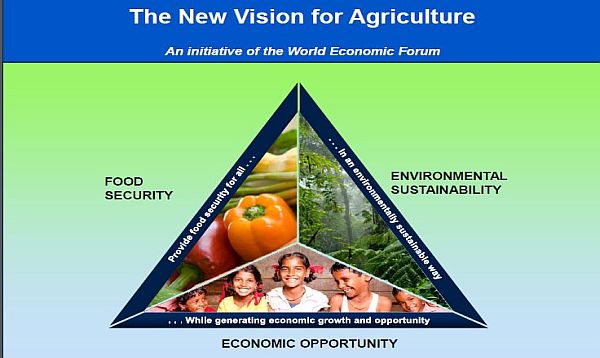Puerto Vallarta, Mexico – Latin America can play a key role in ensuring global food security, leaders said today at the World Economic Forum on Latin America, taking place in Puerto Vallarta, Mexico. However, realizing this potential will require new approaches to ensure sustainability in the long term.
The region is among the top producers of key crops such as corn, soybeans, beef and poultry, generating over 14% of global food exports. It is home to nearly one-third of the land suitable for agricultural expansion. "Latin America has the greatest potential in growing more food in the future," said Shenggen Fan, Director-General, International Food Policy Research Institute (IFPRI), USA. "But environmental factors such as the availability of water and protection of biodiversity will pose a real challenge."
Innovative public-private partnerships, such as one being implemented in Mexico with support from the World Economic Forum, will be key to ensuring sustainable food supplies for a growing global population. The Mexican Agribusiness Partnership for Sustainable Growth engages 32 local and global companies to work with the Government of Mexico, producers’ associations and others to improve the sustainable production of five key crop groups (grains, oilseeds, fruits and vegetables, coffee and cacao, and fisheries).
Led by high-level leaders of business and government, the partnership has developed ambitious plans to improve productivity and farmers’ incomes, and is initiating action on the ground. "We are bringing business, government and producers together in new ways to achieve our common goals," said José Ernesto Cacho Ribeiro, Chief Executive Officer, Grupo Minsa, Mexico, who leads the partnership’s work on grains.
The partnership seeks to benefit farmers and contribute to rural economic growth, said Juan Carlos Cortéz Garcia, President, Consejo Nacional Agropecuario, Mexico. "When farmers succeed, agriculture succeeds too – and this benefits society at large," he stressed.
The partnership reflects a growing global effort to transform agriculture through market-based approaches, supported by the World Economic Forum’s New Vision for Agriculture initiative. A report in Spanish launched today by the initiative, Putting the New Vision for Agriculture into Action: A transformation is happening, outlines the key success factors of such transformations.
Drawing on examples from Mexico and other countries, it outlines the elements that are essential for success in large-scale transformations, ranging from strong leadership and effective strategies to adequate financing, infrastructure and institutional support.
Such transformations require a long-term leadership commitment, which leaders of the Mexican partnership have developed. "Global and local partners are committed to working together," said Juan Carlos Marroquín, Market Head, Grupo Nestlé, Mexico, who is leading the partnership’s work on coffee and cacao.
The New Vision for Agriculture initiative provides global support for the partnership in Mexico as well as initiatives in 10 other countries, driven by 28 global companies, 14 governments and a wide array of other organizations. The initiative facilitates public-private collaboration to achieve food security, environmental sustainability and economic opportunity through agriculture.
"Mexico is demonstrating that the New Vision for Agriculture can be achieved through ambition, hard work and new approaches to working together. We are proud to support these efforts to engage the private sector as a true partner in transforming agriculture," said Sarita Nayyar, Managing Director and Head of Consumer Industries, World Economic Forum USA.
Global leadership through the G20 can help encourage such efforts globally. A private-sector task force providing input to the G20 on food security, with support from the World Economic Forum, presented its recommendations to Mexican President Felipe Calderón today. The group has outlined actions that both business and government can take.
"Government needs to demonstrate leadership, but the private sector can help provide new solutions through investment and innovation," said Daniel Servitje, Chief Executive Officer, Grupo Bimbo, Mexico, who co-chairs the task force.
For more information on the New Vision for Agriculture Initiative, visit weforum.org.


